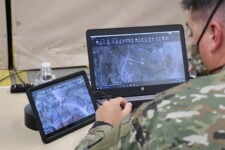 WASHINGTON: Lawmakers want the Pentagon’s intelligence shop to play nice with the rest of the intelligence community, and they have the program to do just that.
WASHINGTON: Lawmakers want the Pentagon’s intelligence shop to play nice with the rest of the intelligence community, and they have the program to do just that.
Included in the Senate Armed Service Committee’s version of the fiscal year 2012 defense authorization bill, a Defense Intelligence Agency-led “pilot demonstration” program will allow the Pentagon to share and receive raw intel gathered by other agencies in the intelligence community.
“The intelligence community has largely overcome the impediments to sharing finished intelligence reporting.. but substantial barriers remain to sharing access to the truly immense amount of raw or unevaluated data that is collected and stored across agencies and departments,” the Senate bill states.
Raw intelligence is much more timely. Finished intelligence may be days, weeks or months old, so sharing raw data is intended to greatly speed the ability of the intelligence community to spot a problem and react.
For example, that across-the-board access to that data could have allowed U.S. intelligence to “connect the dots” on a number of attempted terrorist attacks, including the attempted bombing of an American airliner above Detroit in December 2008.
“Simply put, they cannot solve the counterterrorism connect-the-dots problem, or the more general requirement for enterprise search capabilities, because they do not have access to all or even a majority of the available dots,” according to the Senate legislation.
Lawmakers hope that this program, patterned closely after ones in place at the FBI and the Department of Homeland Security, will try to close that gap.
But before DIA goes running off to try and connect as many dots as it can through this program, it better make sure it has dots to connect, a source with close ties to the intelligence community says.
The SASC‘s attempts to widen intel sharing within the community are moot, according to the source, since U.S. intel agencies “rarely don’t know what is a ‘dot’ is until we see the [full] picture.”
The source also expressed “deep skepticism” on the Senate committee’s plan to base the DIA program on similar, ongoing efforts at the FBI and Department of Homeland Security. They have not proven particularly effective, as recent intel failures such as the Christmas Day terror attempt by Umar Farouk Abdulmutallab, the Nigerian trained by Al Qaeda in the Arabian Peninsula. At least two government agencies had him in their databases and no one connected those nifty little dots. Since then, government counter-terror officials have said they learned their lessons from that and other incidents and have done their best to make sure the dots connect next time.
Australia unveils ‘historic’ defense boost to 2.4% of GDP in decade, but critics say too little, too late
Part of the shakeup includes tens of billions for nuclear-powered subs, and halting the pricey procurement of an additional F-35 fighter jet squadron.



























